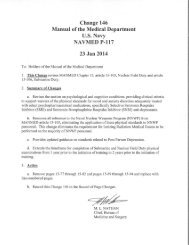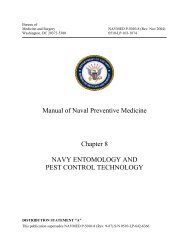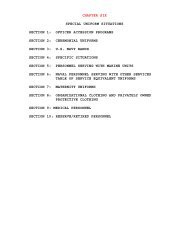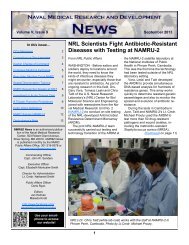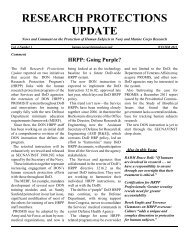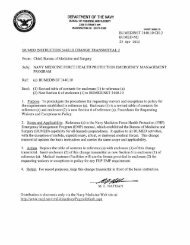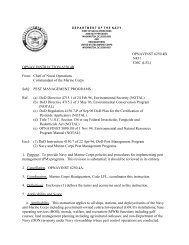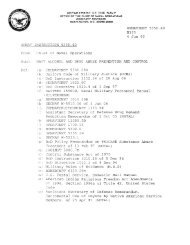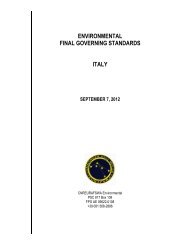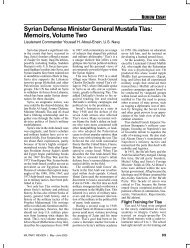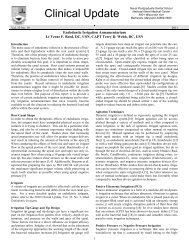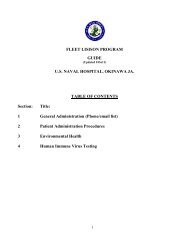May 2013 - Navy Medicine - U.S. Navy
May 2013 - Navy Medicine - U.S. Navy
May 2013 - Navy Medicine - U.S. Navy
Create successful ePaper yourself
Turn your PDF publications into a flip-book with our unique Google optimized e-Paper software.
By Anna Hancock<br />
Deputy Public Affairs Officer<br />
ould you like 10,000,000 Americans to send you one dollar?<br />
W One dollar likely wouldn’t stress the sender’s budget, but for<br />
the recipient, it makes all the difference.<br />
An interesting thought, isn’t it?<br />
Gary Denson, the recycling coordinator for the Environmental<br />
Management Division (EMD) on Marine Corps Base Camp Lejeune<br />
opens his routine presentations with this thought provoking statement.<br />
He uses it to illustrate how one person can make a considerable<br />
difference in environmental sustainability and cost savings.<br />
Naval Hospital Camp Lejeune (NHCL) leadership and staff<br />
members decided earlier this year that they will be the ones who<br />
strive to make a difference. With a mix of initiative, altruism and<br />
executive and base orders, the Directorate for Administration shored<br />
up a recycling program and hosted an Earth Day clean up April 22<br />
marking command-wide efforts in teaming up to clean up.<br />
Leaning Forward<br />
In early <strong>2013</strong>, Commanding Officer Capt. David A. Lane and<br />
Director for Administration Cmdr. Matthew Case noted how they<br />
planned to work with Denson to embark on a proactive recycling<br />
program. Simultaneously, NHCL’s Operations Management<br />
(OpMan) Department was in the midst of reviewing local command<br />
instructions.<br />
“The [local] recycling instruction belongs to OpMan which<br />
drew my attention considering our recycling efforts were very limited<br />
with little guidance,” explained Lt. j.g. Serge Shkuro, operations<br />
management (OpMan) department head. “The program stood out as<br />
an opportunity to make immediate, long-lasting changes through the<br />
command. OpMan did the leg work and the CO and DFA provided<br />
the support.”<br />
After the review, the command set up 12 recycling bins for plastics<br />
and aluminums in high traffic areas targeting the quarterdeck and<br />
waiting areas in the pharmacy, Family <strong>Medicine</strong> Clinic, Obstetrics<br />
and Gynecology Clinic, Emergency Department and the Lighthouse<br />
Café. Twelve additional bins are expected and will be placed in<br />
employee break rooms and staff areas in the near future.<br />
“Recycling every bottle, aluminum can and piece of paper helps<br />
reduce the time it takes to fill a landfill and potentially saves millions<br />
of dollars over the average 25-30 year life span of a landfill,”<br />
Denson noted. “I’m happy to work with the hospital as they stand up<br />
their recycling program.”<br />
The History<br />
In October 2009, a presidential executive order was signed setting<br />
sustainability goals for Federal agencies that focus on improving<br />
their environment, energy and economic performance. Among the<br />
many requirements expressed in the order, a 50% recycling and<br />
waste diversion by 2015.<br />
NHCL took part in recycling efforts for corrugated cardboard<br />
and office paper long before 2009. However, accessibility and<br />
knowledge of the recycling program often posed the largest obstacles.<br />
Only the staff members who knew of the program brought their<br />
materials to the loading dock for recycling. Otherwise, recyclable<br />
materials were discarded in regular waste receptacles.<br />
Since the executive order, the base is making progress towards<br />
the diversion goal but well before 2015. In fiscal year 2012, the base<br />
generated 46,000 tons of solid waste. Of the 46,000 tons, the base<br />
recycled or diverted 12,250 tons. In just March <strong>2013</strong>, the base recycled<br />
or diverted about 573 tons. While metrics are still in the works to<br />
measure the progress of NHCL command initiatives, leadership note<br />
how the frequency in which the bins have to be emptied is increasing<br />
at a rapid pace.<br />
Teaming Up to Clean Up<br />
In line with the recycling efforts, more than 80 civilians and<br />
Sailors teamed up to take part in a hospital ground clean up in<br />
observance of Earth Day on April 22. Earth Day, an observance<br />
established on April 22, 1970 in response to growing public concern<br />
about ecological crises, has long been observed by military members<br />
around the world. NHCL staff members certainly understood the cause.<br />
The volunteers covered specific areas of the hospital grounds<br />
designated by facilities management that were according to directorate.<br />
They picked up trash, cleaned the area of debris and enjoyed taking<br />
part in volunteer work for the greater good of the hospital, the patients<br />
and the environment. Approximately 30 bags of trash were collected<br />
in an hour’s time.<br />
The Right Thing To Do<br />
Amongst other environmentally sustainable initiatives throughout<br />
the command, the new multi-million dollar construction and renovation<br />
projects are the largest. Each building project follows the sustainability<br />
design standards set forth by the General Services Administration’s<br />
Leadership in Energy and Environmental Design (LEED) Green<br />
Building Rating System.<br />
Along the LEED design standards, an energy efficient green<br />
roof was constructed on the outpatient clinic building, local building<br />
materials were used when available to reduce the cost of fuel required<br />
for procurement, and carpool parking spots close to the facility were<br />
designated to incentivize environmentally friendly decisions by patients<br />
and staff members.<br />
“What I like most about our team is that we are a group of forward<br />
thinkers who value the benefits reaped from working together as a<br />
team,” explained Case. “We do these things like recycling, Earth<br />
Day clean ups and ‘going green’ in our construction and renovation<br />
projects because we know it’s the right thing to do, and we are<br />
committed to bringing value in everything we do.”<br />
Electronic Edition: www.issuu.com/nhclejeune 4



